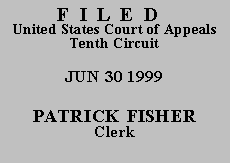

| DOUGLAS RANDALL O'NEAL, |
|
| v. | |
| STEVE NOON KESTER, Chief Warden; ATTORNEY GENERAL OF THE STATE OF OKLAHOMA, |
Douglas Randall O'Neal seeks a certificate of appealability to challenge the dismissal of his 28 U.S.C. § 2254 petition as untimely under the one-year statute of limitations in 28 U.S.C. § 2244(d). To succeed, he must make "a substantial showing of the denial of a constitutional right." 28 U.S.C. § 2253(c)(2). While O'Neal argues that § 2244(d) "should not be applied retroactively" and that he "had no notice that the one-year statute of limitations applied to 28 U.S.C. § 2254 habeas corpus petitions in the Tenth Circuit," Appellant's Br. at 9, he does not so much as mention any constitutional right allegedly violated by the application of § 2244(d).(1) We therefore deny the certificate.
Even if we were to postulate some constitutional basis for O'Neal's claims, they are meritless, as explained by the district court's opinion. O'Neal's conviction became final in 1993. The present version of § 2244(d), containing the one-year statute of limitations, went into effect April 24, 1996, so at most O'Neal had one year from that date, plus tolling, to file his petition. He had exhausted state post-conviction remedies (and thus tolling of the statute ended) by April 11, 1997. He filed the present petition long after April 11, 1998, on June 18, 1998.
That our decision in Hoggro v. Boone, 150 F.3d 1223 (10th Cir. 1998), was not rendered until June 24, 1998, is irrelevant. Hoggro did not "adopt[]" §2244(d) "as it applied to 28 U.S.C. § 2254 petitions," Appellant's Br. at 3-4; Congress did. Section 2244(d) by its very terms applies to § 2254 petitions. What Hoggro "adopted" was the most lenient grace period possible for the retroactive application of the statute--the full year. With or without Hoggro, once § 2244(d) was enacted, O'Neal was on notice of the statute of limitations and could never reasonably expect that he would be allowed more than one year plus tolling to file his petition.
The certificate of appealability is DENIED.
ENTERED FOR THE COURT
Stephen H. Anderson
Circuit Judge
*.This order and judgment is not binding precedent, except under the doctrines of law of the case, res judicata, and collateral estoppel. The court generally disfavors the citation of orders and judgments; nevertheless, an order and judgment may be cited under the terms and conditions of 10th Cir. R. 36.3.
1.That the merits of O'Neal's petition may contain constitutional issues is irrelevant; the merits are not before us.